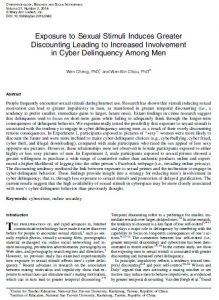Socialization & Relationship Outcomes
Exposure to Sexual Stimuli Induces Greater Discounting
 Full Article Name: Exposure to Sexual Stimuli Induces Greater Discounting Leading to Increased Involvement in Cyber Delinquency Among Men
Full Article Name: Exposure to Sexual Stimuli Induces Greater Discounting Leading to Increased Involvement in Cyber Delinquency Among Men
Open Access: No
Abstract
People frequently encounter sexual stimuli during Internet use. Research has shown that stimuli inducing sexual motivation can lead to greater impulsivity in men, as manifested in greater temporal discounting (i.e., a tendency to prefer smaller, immediate gains to larger, future ones). Extant findings in crime research suggest that delinquents tend to focus on short-term gains while failing to adequately think through the longer-term consequences of delinquent behavior. We experimentally tested the possibility that exposure to sexual stimuli is associated with the tendency to engage in cyber delinquency among men, as a result of their overly discounting remote consequences. In Experiment 1, participants exposed to pictures of “sexy” women were more likely to discount the future and were more inclined to make cyber-delinquent choices (e.g., cyberbullying, cyber fraud, cyber theft, and illegal downloading), compared with male participants who rated the sex appeal of less sexy opposite-sex pictures. However, these relationships were not observed in female participants exposed to either highly or less sexy pictures of men. In Experiment 2, male participants exposed to sexual primes showed a greater willingness to purchase a wide range of counterfeit rather than authentic products online and experienced a higher likelihood of logging into the other person’s Facebook webpage (i.e., invading online privacy). The discounting tendency mediated the link between exposure to sexual primes and the inclination to engage in cyber-delinquent behavior. These findings provide insight into a strategy for reducing men’s involvement in cyber delinquency; that is, through less exposure to sexual stimuli and promotion of delayed gratification. The current results suggest that the high availability of sexual stimuli in cyberspace may be more closely associated with men’s cyber-delinquent behavior than previously thought.
Citation
Cheng, W., & Chiou, W. B. (2018). Exposure to sexual stimuli induces greater discounting leading to increased involvement in cyber delinquency among men. Cyberpsychology, Behavior and Social Networking, 21(2), 99–104. https://doi.org/10.1089/cyber.2016.0582
